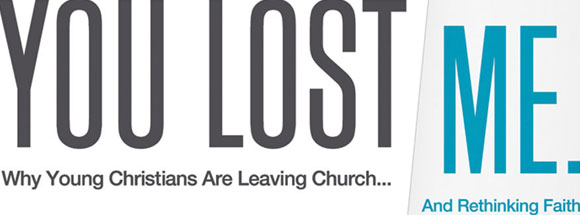why are young christians leaving the church?

i pastor a church primarily comprised of 20- and 30-somethings. amongst that group, a relatively large percentage have come back to the church after a period of time away. generally speaking, like many, at some time after high school, they drifted away (or just made a decision to leave) and had a difficult time reconnecting. hearing their stories of why they left and why they’ve returned is always fascinating to me.
certainly, the people at our church aren’t an exception. barna group president david kinnaman, in his new book you lost me: why young christians are leaving church and rethinking church, presents his findings of an extensive research project that included interviews with teenagers, young adults, parents and pastors. kinnaman focused on 20-somethings who were regular churchgoers during their teenage years but disconnected at some point after the age of 15.
his research found 6 reasons that a majority of young christians (59%) disconnect either permanently or for an extended period of time from the church. here are the reasons:
1. churches seem overprotective
2. a shallow experience of christianity
3. antagonism (by the church) toward science
4. simplistic and judgmental stances on/ways of addressing sexuality
5. the exclusivity of christianity
6. doubt is unwelcome
i rarely write specifically to pastors and church leaders, but this is a good opportunity to do just that. my question is, based on this list, would 20-somethings leave or come to your church?
1. churches seem overprotective
have you created a community where engagement with the broader culture is not only welcomed but encouraged? rather than oppositional, do you view the broader culture as an integrated part of the christian walk? are you equipping people to view the world through a lens of generative friendship, grace, redemption and love?
2. a shallow experience of christianity
are you creating an atmosphere that allows for rich and engaging experiences with god and others in your worship gatherings? are you teaching and engaging dialogue that helps to build a bridge between sunday and the rest of the week? are you teaching the values of jesus or the values of your church?
3. antagonism (by the church) toward science
do you value and practice theological humility or do you present propositional facts that are closed to conversation? have you fostered a dialogue in which logical reasoning is welcomed as a part of one’s faith experience? have you created a dichotomy between science and faith that forces a choice between the two?
4. simplistic and judgmental stances on/ways of addressing sexuality
are you in denial about the sexual activity of your community (nearly 80% of 20-something churchgoers have had sex prior to marriage)? have you created an open, honest and respectful environment where people can discuss sexuality without judgment? have you assumed that opposite gender attractions/sexuality is the only or “standard” view of sexuality within your church? have you fostered an atmosphere of judgment and shame when people engage in sex beyond your assumptions of what is right?
5. the exclusivity of christianity
are you truly familiar with the beliefs of other faith traditions (not just stereotypes and surface level assumptions) to have fruitful conversations about both the similarities and differences? is your church fully inclusive of every faith tradition, race, class, sexual orientation and every other thing that has historically divided our churches? have you created a country club mentality where only a very narrow definition of a person will ever truly fit in?
6. doubt is unwelcome
have you created a safe place for open and honest doubt? have you—as a leader—been honest (publicly) about any doubts you have/had? do you allow for a little space when people in your community express genuine doubt and need time to step away/explore? are you dismissive when people actually open up about doubt?
how do you answer these questions? truth be told, my answers aren’t always exemplary. at eikon church, we’ve tried very hard and have been very intentional to answer these questions in positive ways. don’t get me wrong, we absolutely miss the mark very, very often, but our key has been intentionality and accountability. we also try to be open to criticism. quite frankly, we’ve been challenged with some of these questions, both me personally and more broadly, as a church. usually it results in an initial defensiveness, but we’re often able to see another point of view and respond accordingly.
so, if you’re a church leader, take a stab at answering these questions. if you’re like me (and our church), you’ll struggle greatly with many of your answers. but you’ll have the opportunity to lead people—particularly 20-somethings—into a more vibrant part of your faith community and into more fully discovering what it means to walk in the way of jesus.












